Zespół Badawczy Historii Globalnej – seminarium

Zapraszamy na kolejne seminarium im. Mariana Małowista z cyklu Seminarium Global History & Anthropology. Naszym gościem będzie Stephen Smith, emerytowany profesor Uniwersytetu w Oksfordzie (All Souls College). Wygłosi on wykład „The politics of rumour in the Soviet Union (1917-1941) and the People’s Republic of China (1949-1976)”.
Seminarium odbędzie się 7 lutego 2022 r. o godz. 17.00 w sali 125 na Wydziale Historii UW.
W spotkaniu można wziąć udział także online.
Abstrakt:
Access to archives in Russia and China has demonstrated how seriously the Communist authorities took rumor. Rumour is present in all societies, but it acquires particular importance in peasant societies where there are high levels of illiteracy. Moreover, it tends to thrive in climates of fear and social crisis, which was abundant as Communist regimes sought to overcome social and economic backwardness. In Communist societies, moreover, rumour had some specific functions, serving as a form of underground news and political dissent in the face of the official media. I argue that rumors should be understood as stories that tell us how ordinary people felt about the world they were living in. On the one hand, they were responses that reflect in culturally specific terms — through legends, religious idioms, folk understandings – the conscious and unconscious concerns of those who retail them. On the other, the put their own meaning on social and political circumstances often very different from official ideology and they thus have the potential to bring about dissatisfaction and disorder. I shall focus on two very different rumours. The first circulated in the Russian Federation in 1939-40 and told of truck drivers going through dense forest who suddenly found their vehicles stopping and a ‘white woman’ appearing in order to urge the drivers to make people know that war, famine and other disasters were imminent. The second rumour spread widely in eastern and northern China between 1950 and 1954 and told of ‘hairy men and water demons’ that had been sent with the connivance of the new Communist government to steal the vital organs of ordinary folk to allow the Soviet Union to make an atom bomb. In line with the recent conference on Global Easts, the paper looks at the interaction of internal and external politics, suggesting how voices from the periphery urged Communist leaders to pay attention to what was going on in the world around them.